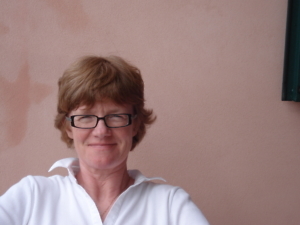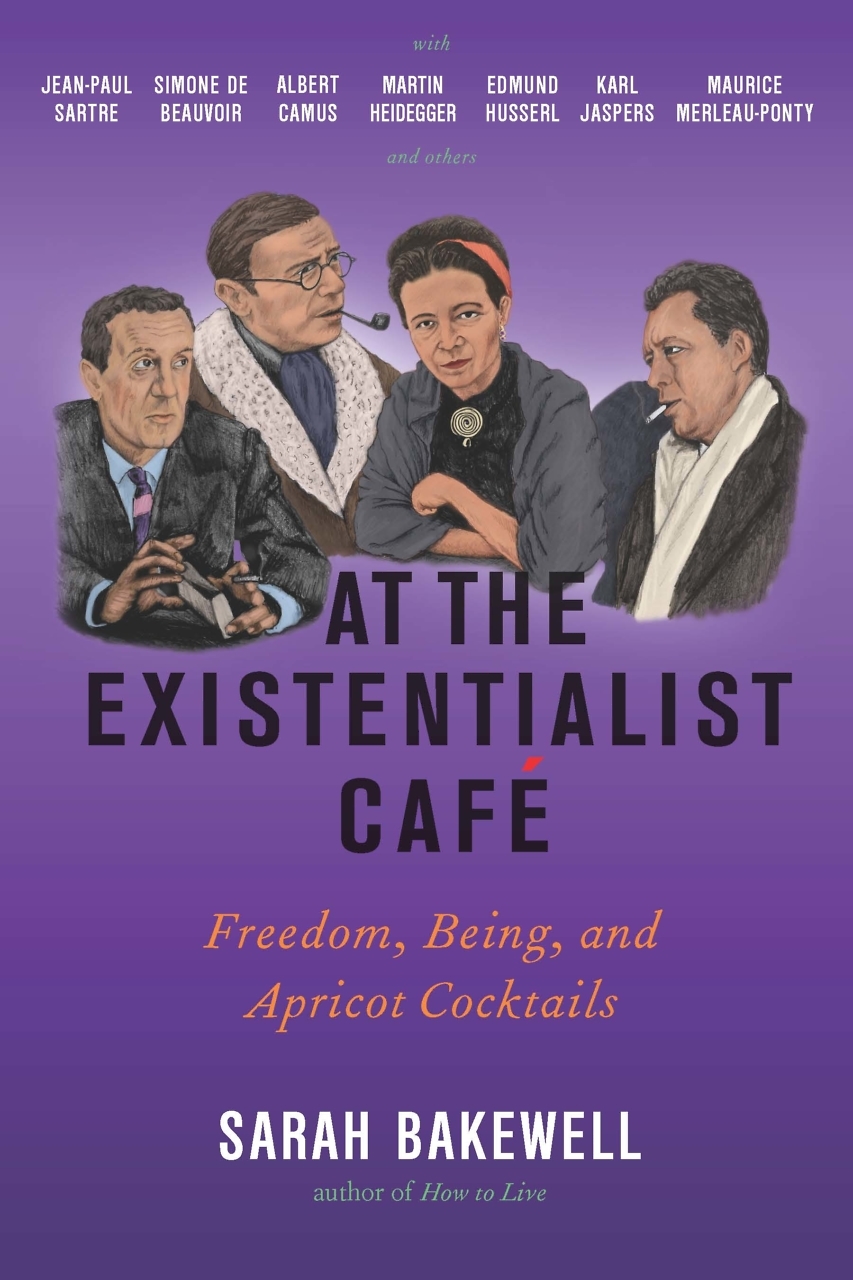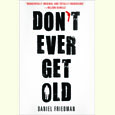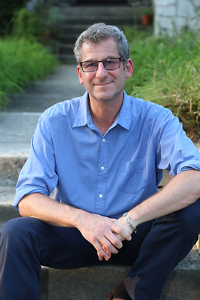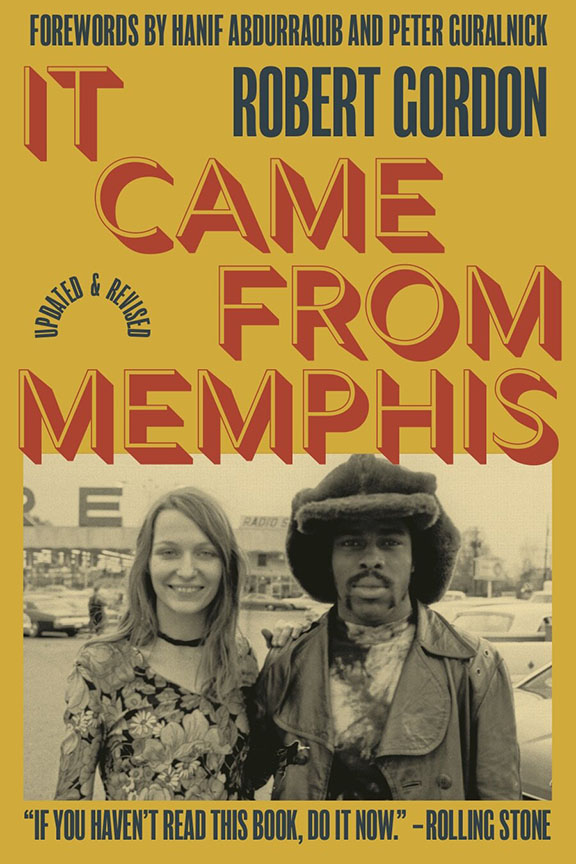The Secret Fusion
Novelist Jonathan Miles talks with Chapter 16 about comedy and philosophy in fiction
Jonathan Miles has a gift for transforming life’s base materials into literary gold. His first novel, Dear American Airlines (2008), turns a frustrated flyer’s epistolary request for a refund into a broad-ranging and hilarious confession of missed connections and self-created turbulence. The story’s confining premise helps create a sense of urgency as the narrator surveys his wrecked existence and staves off the temptation to fly permanently off course.
With his second novel, Want Not (2013), Miles broadens the narrative scope to include three over-lapping story lines but continues to explore dark, potentially dispiriting themes. With his deft, comedic touch, however, he manages to address bleak topics—urban foraging, debt collection, and Alzheimer’s—in chapters that are by turns funny, meditative, and moving.
 Before his appearance in the Writers in the Library series at the University of Tennessee in Knoxville, Miles answered questions from Chapter 16 via email.
Before his appearance in the Writers in the Library series at the University of Tennessee in Knoxville, Miles answered questions from Chapter 16 via email.
Chapter 16: The characters in both your novels are noteworthy for being simultaneously flawed and sympathetic: they make mistakes, but we cheer for their rehabilitation. How do you go about creating character?
Jonathan Miles: Flawless people (rare as unicorns) are, to me, about as interesting as sociopaths: that is, not at all. My characters are reflections of the people I see and know: messy-brained, conflicted, sometimes thrilled and other times bewildered by their existence. One of the great pleasures (and sometimes frustrations) of writing fiction comes when your characters go wriggling out of your control, taking charge of their own destinies. When they become disobedient, and go about breaking all your commandments. There’s nothing you can do, at that point, but chase after them with your notebook, furiously scribbling. The character of Christopher, in Want Not, is an example: his role was conceived as a fleeting cameo, but no matter what I did, no matter how many times I shoo’d him away or changed the locks, he just kept wandering back into scenes. It can be difficult, but you have to allow for narrative turmoil, for life. You have to let your characters break shit.
Chapter 16: Your novels provide drama but are also hilarious. As a writer, how do you know when the comedy is working? Do you laugh at your own writing?
Miles: I’ve never laughed at my own writing, because—and I’m not certain I should admit this—I almost never recognize what I’m writing as comic. That is, I’ve never consciously tossed in a banana peel for one of my characters to slip on. In fact I’m sometimes surprised by what causes people to laugh at readings. A year or so ago I brought this up while drinking at a bar with a critic friend. He explained to me that it’s my worldview that’s comic—that the lens with which I view life, on paper and off, is patently absurd. So it would be unseemly for me to take credit for what appears to be a psychological impediment. But then it’s an impediment I come by honestly: my mother’s people were Irish. Whether they laughed till they cried or cried till they laughed was never entirely clear.
Chapter 16: You have said in interviews that Want Not, with its broad canvas and third-person-omniscient narrator, reverses the formal elements of Dear American Airlines. What motivated you to take on such a different challenge?
 Miles: The story tends to dictate the telling. Want Not began as an image in my head—two women and a newborn beside a dumpster—and it seemed instantly clear to me that I would need to follow both women’s journey into that image. The novel I’m writing now veers off in a completely different narrative direction. Writing, like sex, is most fun when you’re not sure what you’re doing.
Miles: The story tends to dictate the telling. Want Not began as an image in my head—two women and a newborn beside a dumpster—and it seemed instantly clear to me that I would need to follow both women’s journey into that image. The novel I’m writing now veers off in a completely different narrative direction. Writing, like sex, is most fun when you’re not sure what you’re doing.
Chapter 16: Reviewers have described both of your novels as “philosophical,” though a better term for them may be “reflective.” How do you balance the meditative elements of your fiction with the demands of plot and character?
Miles: I’m going to let Albert Camus answer this question because he said it best: “A novel is never anything but a philosophy put into images.” The “secret fusion between experiences and ideas,” he went on, “between life and reflection on the meaning of life,” is what the novelist should seek to present. This is one of the great liberties and privileges afforded the novelist: we get to explore the life of the mind. It’s rather hard for a filmmaker to get close-up footage of an idea.
Chapter 16: Want Not, like Dear American Airlines, is replete with quotable lines, some of which sound like modern aphorisms (for example, “We are what we bury”). Is that phrase-making quality something you consciously cultivate in your fiction, or does it arise organically from the material?
Miles: There’s no conscious cultivation, no. What’s there, if anything, is an old and pleasurable habit of playing with language. Of stretching and slapping it like Silly Putty. It’s the same impulse I see in my daughter when she sits at the piano playing random notes together, to put new sounds in her ears. Prose has many of the same dimensions as music: rhythm, tone, phrasing, dynamics, dissonance, et al. So noodling on the page is not so unlike noodling on the piano: it can feel like joyous child’s play.
Chapter 16: In the last decade-plus, you have worked regularly as a journalist while producing two novels. Aside from the question of fact, how is writing fiction different from journalism for you?
Miles: The obvious difference, I suppose, is that with fiction, unlike with journalism, I always retain the option of introducing a rabid wolverine to a scene and directing it to maul anyone deserving of a mauling. (You cannot do this in political journalism, much as you might desire—at least not in the draft you submit to your editors.) What journalism does for me, quite often, is feed the fiction—it pushes me out into the world, into fresh terrain, and allows me to have conversations I might otherwise never have had. I’m not interested in writing about myself—what I see outside, and what I see in the people I encounter, is infinitely more captivating.

Sean Kinch grew up in Austin and attended Stanford University as an undergraduate. He later returned to Austin, where he earned a Ph.D. in modern fiction from the University of Texas. He now teaches English at Montgomery Bell Academy in Nashville.
